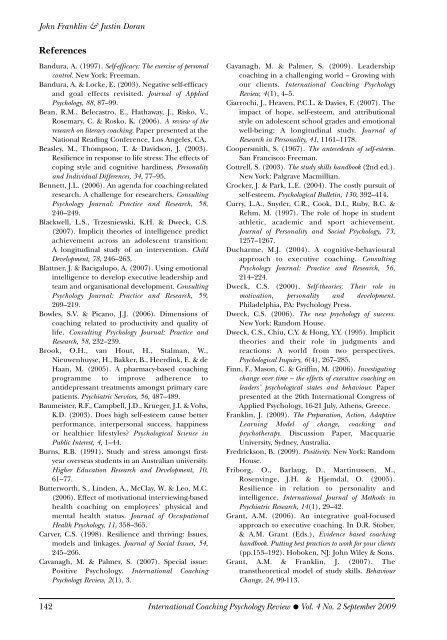International Coaching Psychology Review, 4.2, September 2009
International Coaching Psychology Review, 4.2, September 2009
International Coaching Psychology Review, 4.2, September 2009
You also want an ePaper? Increase the reach of your titles
YUMPU automatically turns print PDFs into web optimized ePapers that Google loves.
John Franklin & Justin Doran<br />
References<br />
Bandura, A. (1997). Self-efficacy: The exercise of personal<br />
control. New York: Freeman.<br />
Bandura, A. & Locke, E. (2003). Negative self-efficacy<br />
and goal effects revisited. Journal of Applied<br />
<strong>Psychology</strong>, 88, 87–99.<br />
Bean, R.M., Belecastro, E., Hathaway, J., Risko, V.,<br />
Rosemary, C. & Rosko, K. (2006). A review of the<br />
research on literacy coaching. Paper presented at the<br />
National Reading Conference, Los Angeles, CA.<br />
Beasley, M., Thompson, T. & Davidson, J. (2003).<br />
Resilience in response to life stress: The effects of<br />
coping style and cognitive hardiness. Personality<br />
and Individual Differences, 34, 77–95.<br />
Bennett, J.L. (2006). An agenda for coaching-related<br />
research. A challenge for researchers. Consulting<br />
<strong>Psychology</strong> Journal: Practice and Research, 58,<br />
240–249.<br />
Blackwell, L.S., Trzesniewski, K.H. & Dweck, C.S.<br />
(2007). Implicit theories of intelligence predict<br />
achievement across an adolescent transition:<br />
A longitudinal study of an intervention. Child<br />
Development, 78, 246–263.<br />
Blattner, J. & Bacigalupo, A. (2007). Using emotional<br />
intelligence to develop executive leadership and<br />
team and organisational development. Consulting<br />
<strong>Psychology</strong> Journal: Practice and Research, 59,<br />
209–219.<br />
Bowles, S.V. & Picano, J.J. (2006). Dimensions of<br />
coaching related to productivity and quality of<br />
life. Consulting <strong>Psychology</strong> Journal: Practice and<br />
Research, 58, 232–239.<br />
Brook, O.H., van Hout, H., Stalman, W.,<br />
Nieuwenhuyse, H., Bakker, B., Heerdink, E. & de<br />
Haan, M. (2005). A pharmacy-based coaching<br />
programme to improve adherence to<br />
antidepressant treatments amongst primary care<br />
patients. Psychiatric Services, 56, 487–489.<br />
Baumeister, R.F., Campbell, J.D., Krueger, J.I. & Vohs,<br />
K.D. (2003). Does high self-esteem cause better<br />
performance, interpersonal success, happiness<br />
or healthier lifestyles? Psychological Science in<br />
Public Interest, 4, 1–44.<br />
Burns, R.B. (1991). Study and stress amongst firstyear<br />
overseas students in an Australian university.<br />
Higher Education Research and Development, 10,<br />
61–77.<br />
Butterworth, S., Linden, A., McClay, W. & Leo, M.C.<br />
(2006). Effect of motivational interviewing-based<br />
health coaching on employees’ physical and<br />
mental health status. Journal of Occupational<br />
Health <strong>Psychology</strong>, 11, 358–365.<br />
Carver, C.S. (1998). Resilience and thriving: Issues,<br />
models and linkages. Journal of Social Issues, 54,<br />
245–266.<br />
Cavanagh, M. & Palmer, S. (2007). Special issue:<br />
Positive <strong>Psychology</strong>. <strong>International</strong> <strong>Coaching</strong><br />
<strong>Psychology</strong> <strong>Review</strong>, 2(1), 3.<br />
Cavanagh, M. & Palmer, S. (<strong>2009</strong>). Leadership<br />
coaching in a challenging world – Growing with<br />
our clients. <strong>International</strong> <strong>Coaching</strong> <strong>Psychology</strong><br />
<strong>Review</strong>, 4(1), 4–5.<br />
Ciarrochi, J., Heaven, P.C.L. & Davies, F. (2007). The<br />
impact of hope, self-esteem, and attributional<br />
style on adolescent school grades and emotional<br />
well-being: A longitudinal study. Journal of<br />
Research in Personality, 41, 1161–1178.<br />
Coopersmith, S. (1967). The antecedents of self-esteem.<br />
San Francisco: Freeman.<br />
Cottrell, S. (2003). The study skills handbook (2nd ed.).<br />
New York: Palgrave Macmillian.<br />
Crocker, J. & Park, L.E. (2004). The costly pursuit of<br />
self-esteem. Psychological Bulletin, 130, 392–414.<br />
Curry, L.A., Snyder, C.R., Cook, D.I., Ruby, B.C. &<br />
Rehm, M. (1997). The role of hope in student<br />
athletic, academic and sport achievement.<br />
Journal of Personality and Social <strong>Psychology</strong>, 73,<br />
1257–1267.<br />
Ducharme, M.J. (2004). A cognitive-behavioural<br />
approach to executive coaching. Consulting<br />
<strong>Psychology</strong> Journal: Practice and Research, 56,<br />
214–224.<br />
Dweck, C.S. (2000). Self-theories: Their role in<br />
motivation, personality and development.<br />
Philadelphia, PA: <strong>Psychology</strong> Press.<br />
Dweck, C.S. (2006). The new psychology of success.<br />
New York: Random House.<br />
Dweck, C.S., Chiu, C.Y. & Hong, Y.Y. (1995). Implicit<br />
theories and their role in judgments and<br />
reactions: A world from two perspectives.<br />
Psychological Inquiry, 6(4), 267–285.<br />
Finn, F., Mason, C. & Griffin, M. (2006). Investigating<br />
change over time – the effects of executive coaching on<br />
leaders’ psychological states and behaviour. Paper<br />
presented at the 26th <strong>International</strong> Congress of<br />
Applied <strong>Psychology</strong>, 16-21 July, Athens, Greece.<br />
Franklin, J. (<strong>2009</strong>). The Preparation, Action, Adaptive<br />
Learning Model of change, coaching and<br />
psychotherapy. Discussion Paper, Macquarie<br />
University, Sydney, Australia.<br />
Fredrickson, B. (<strong>2009</strong>). Positivity. New York: Random<br />
House.<br />
Friborg, O., Barlaug, D., Martinussen, M.,<br />
Rosenvinge, J.H. & Hjemdal, O. (2005).<br />
Resilience in relation to personality and<br />
intelligence. <strong>International</strong> Journal of Methods in<br />
Psychiatric Research, 14(1), 29–42.<br />
Grant, A.M. (2006). An integrative goal-focused<br />
approach to executive coaching. In D.R. Stober,<br />
& A.M. Grant (Eds.), Evidence based coaching<br />
handbook. Putting best practices to work for your clients<br />
(pp.153–192). Hoboken, NJ: John Wiley & Sons.<br />
Grant, A.M. & Franklin, J. (2007). The<br />
transtheoretical model of study skills. Behaviour<br />
Change, 24, 99-113.<br />
142 <strong>International</strong> <strong>Coaching</strong> <strong>Psychology</strong> <strong>Review</strong> ● Vol. 4 No. 2 <strong>September</strong> <strong>2009</strong>

















